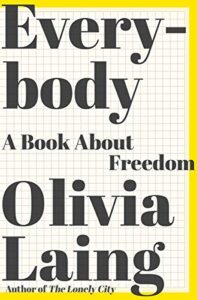
Olivia Laing on Writing the Global Story of Liberation
The Author of Everybody Discusses Power and Freedom
This first appeared in Lit Hub’s Craft of Writing newsletter—sign up here.
Everybody is the hardest book I’ve written. I wanted to investigate the body and its relationship to freedom, but I didn’t want to repeat old forms. My first three books used a first-person travelogue structure to link all the disparate, roving material, and I really didn’t want to do that again. I wanted to find a new way of connecting everything that didn’t rely on my walking through a city or handling material in an archive.
At the same time, the material itself was overwhelming. I had the idea for Everybody in the summer of 2015, at the height of the refugee crisis in Europe. The next year was extraordinarily chaotic — first Britain voted for Brexit, and then Trump won the election in the USA. White supremacy was on the rise, and every day the media was full of stories of ultra-violence and prejudice. What I wanted was to understand the forces that lay behind all this — to get to grips with why so much hatred is directed at particular types of bodies and to explore bodily vulnerability and bodily power.
These were questions I’d been thinking about for a very long time. As a teenager I dropped out of university to become an environmental activist, living in treehouses to protect ancient woodlands in the path of proposed roads. When I burned out, I trained to become an herbalist, spending my twenties deeply immersed in illness and its many causes. During that period, I came across the work of Wilhelm Reich, the renegade psychoanalyst who invented body psychotherapy. Reich was Freud’s most brilliant protégé, and his extraordinary life spanned Europe and America, linking together multiple aspects of bodily experience, from illness to sex, protest to prisons.
Slowly, I realized that I could use Reich as the central figure in Everybody, letting him lead me into encounters with a multitude of different figures who struggled for bodily freedom, from Susan Sontag to Kate Bush to James Baldwin. But now I had another problem. Reich is an immensely complex figure, at once an admirable utopian thinker and a dangerous crank who was violent to his wife. I’ve written about many complicated figures before, from Ernest Hemingway to Henry Darger, but no one quite so extreme.
We’re in a moment where people are understood as either good or bad, where a single misstatement or wrong opinion leads to cancellation and public shaming. I don’t think that’s the route to freedom, and so I made the decision not to sanitize Reich or any of the other characters in Everybody. These people fought for freedom and the fact that their personal lives were complicated and painful is a part of that larger story, not something to be censored or concealed.
Everybody took me five years to write. It spans a century and considers liberation movements of many kinds. It begins in Austria just after the First World War and ends with Nina Simone sitting on her couch, telling a filmmaker what freedom means to her. All the way through, I had the image of the body as a locked box, a prison cell, the source of our deepest fears and pains, and at the same time, our only route to freedom, connection, joy. I’m writing now from lockdown, in a world where a virus has forced us all into isolation, and yet Black Lives Matter protests have surged across the planet, as thousands of people have joined the movement for racial justice, demanding an end to white supremacy.
Here’s what I can tell you about freedom: while it is true that it can be rescinded, it can always be won anew. Liberation is a project that extends far beyond any individual life, a struggle that each one of us can choose to hinder or advance.
*
Read more on exploring the body in writing:
Ada Limón on relating to the body after lockdown.
Jenny Zhang on talking explicitly about bodies.
Sandra Beasley on identifying as a disabled writer.
Veronica Esposito on storytelling and language around trauma.
*
5 Books on Freedom and the Body
RECOMMENDED BY OLIVIA LAING
Christopher Turner, Adventures in the Orgasmatron: How the Sexual Revolution Came
to America
Angela Carter, The Sadeian Woman
Malcolm X, The Autobiography of Malcolm X
Wilhelm Reich, The Mass Psychology of Fascism
Andrea Dworkin, Last Days at Hot Slit
__________________________________

Everybody by Olivia Laing is available via W. W. Norton.
Olivia Laing
Olivia Laing is an internationally acclaimed writer and critic. They’re the author of eight books, including The Lonely City, Everybody, and the Sunday Times number one bestseller The Garden Against Time. Laing’s first novel, Crudo, won the James Tait Black Memorial Prize, and in 2018 they were awarded the Windham–Campbell Prize for nonfiction. Their books have been translated into twenty-one languages.



















